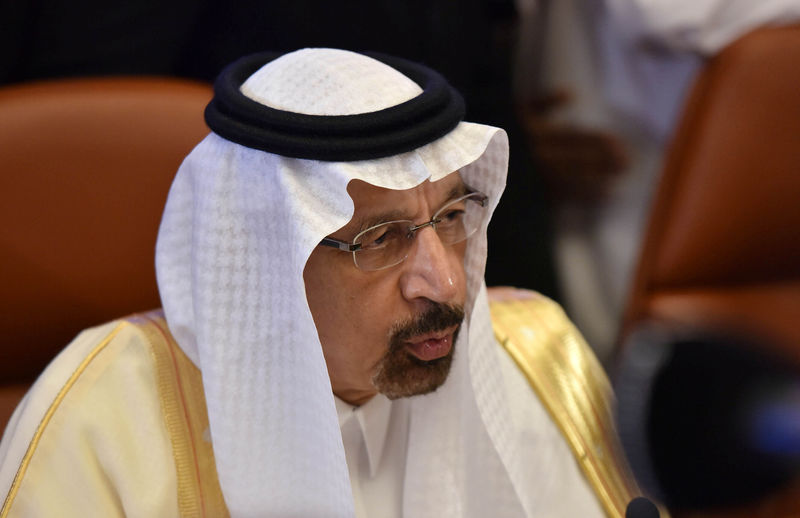By Rania El Gamal and Vladimir Soldatkin
JEDDAH, Saudi Arabia (Reuters) - Saudi Energy Minister Khalid al-Falih said on Sunday there was consensus among OPEC and allied oil producers to drive down crude inventories "gently" but his country would remain responsive to the needs of what he called a fragile market.
Falih said a possible rollover in the second half of 2019 of output curbs agreed by OPEC and non-members was the main option discussed at a ministerial panel meeting during the day but "things can change by June".
"This second half, our preference is to maintain production management to keep inventories on their way declining gradually, softly but certainly declining towards normal levels," he told a news conference after the panel meeting.
OPEC, Russia and other non-member producers, an alliance known as OPEC+, agreed to reduce output by 1.2 million barrels per day (bpd) from Jan. 1 for six months, a deal designed to stop inventories building up and weakening prices.
Russian Energy Minister Alexander Novak earlier said an easing of cuts had been discussed and the supply situation would be clearer in a month, including from countries under sanctions.
Two sources said Saudi Arabia, OPEC's de facto leader, and Russia were discussing two main scenarios for June's OPEC+ meeting and that both frameworks proposed higher output from the second half.
One scenario was to eliminate over-compliance with agreed cuts, which would increase output by some 0.8 million bpd, while the other option was to ease the agreed cuts to 0.9 million bpd.
Falih told reporters the market was "very fragile" with conflicting data due to concerns about supply disruptions while inventories rise, but that a "comfortable supply situation" should be seen in weeks and months to come.
He said high compliance with the agreed cuts was not sustainable and that over-conformity by some countries "can be reversed in June".
The minister said that if a decision were taken at that meeting to roll over cuts, then Saudi Arabia would stay within those limits. He said the kingdom's oil output in May and June was planned to be 9.8 million bpd.
"It is critical that we don’t make hasty decisions – given the conflicting data, the complexity involved, and the evolving situation," Falih said, describing the outlook as "quite foggy" due in part to a U.S.-China trade dispute.
"But I want to assure you that our group has always done the right thing in the interests of both consumers and producers; and we will continue to do so," he added.
Falih said Saudi oil output in July would remain within its OPEC production target.
United Arab Emirates Energy Minister Suhail al-Mazrouei had told reporters that producers were capable of filling any market gap and that relaxing supply cuts was not "the right decision".
Mazrouei said the UAE did not want to see a rise in inventories that could lead to a price collapse. He said OPEC's job "is not done yet" and that there was no need to alter the agreement in the meantime.
U.S. crude inventories rose unexpectedly last week to their highest since September 2017, Energy Information Administration data showed.
DELICATE BALANCE
Saudi Arabia sees no need to boost production quickly now, with oil at around $70 a barrel, as it fears a price crash and a build-up in inventories, OPEC sources said. The United States, not a member of OPEC+ but a close ally of Riyadh, wants the group to boost output to lower oil prices.
Falih has to find a balance between keeping the oil market well supplied and prices high enough for Riyadh's budget needs, while pleasing Moscow to ensure Russia remains in the OPEC+ pact, and being responsive to the concerns of the United States and the rest of OPEC+, sources said.
Iran's oil exports are likely to drop further in May and Venezuelan shipments could fall again in coming weeks due to U.S. sanctions.
Falih said oil demand in Asia had picked up, while demand in the United States for Saudi crude had dropped. He said nobody knew what Iran was producing or exporting, adding that he believed "a lot" of Iranian oil was unaccounted for.
Oil contamination forced Russia to halt flows along the Druzhba pipeline - a key conduit for crude into Eastern Europe and Germany - in April, leaving refiners scrambling for supplies.
Novak said Russia would restore its output in May and that contaminated oil would not affect its annual output forecast.
OPEC's agreed share of the cuts is 800,000 bpd, but its actual reduction is far larger due to the production losses in Iran and Venezuela. Both are exempt from the voluntary reductions under the OPEC-led deal.
REGIONAL TENSIONS
Oil prices edged lower on Friday due to demand fears amid a standoff in Sino-U.S. trade talks, but ended the week higher on concerns over disruptions in Middle East shipments due to U.S.-Iran political tensions.
Tensions between Saudi Arabia and Iran are running high after last week's attacks on two Saudi oil tankers off the UAE coast and another on Saudi oil facilities inside the kingdom.
Riyadh accused Tehran of ordering the drone strikes on oil pumping stations, for which Yemen's Iran-aligned Houthi group claimed responsibility. The UAE has blamed no one for the tanker sabotage. Iran has distanced itself from both sets of attacks.
“Although it has not affected our supplies, such acts of terrorism are deplorable," Falih said. "They threaten uninterrupted supplies of energy to the world and put a global economy that is already facing headwinds at further risk."

The attacks come as the United States and Iran spar over Washington's tightening of sanctions aimed at cutting Iranian oil exports to zero, and an increased U.S. military presence in the Gulf over perceived Iranian threats to U.S. interests.